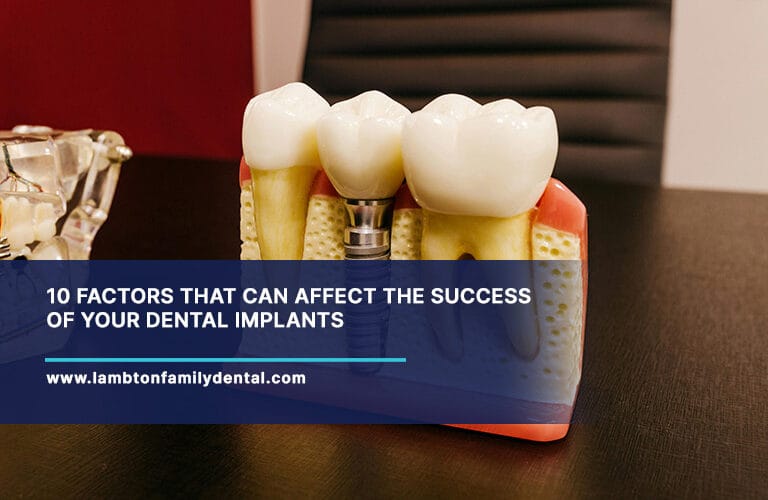Dental implants are a reliable and long-term solution for replacing missing teeth, offering a natural look and feel. While they have a high success rate, certain factors can influence how well they heal and integrate with your jawbone.
From oral hygiene to lifestyle choices, many elements contribute to the overall outcome of the procedure. By understanding these key factors, you can take steps to increase the likelihood of a successful and lasting implant.
Key Insights into Dental Implants in Sarnia
Dental implants are small titanium posts placed into your jawbone to replace missing teeth. They are a popular option for individuals in Sarnia because of their durability and natural appearance. The procedure involves multiple steps, including implant placement, healing, and attaching the crown, but the results are well worth the time.
Choosing dental implants in Sarnia offers numerous benefits, such as restoring function and aesthetics to your smile. The process also requires the surrounding bone to heal around the implant to ensure stability. While the success rate is high, there are several factors that could influence the outcome of the procedure.
10 Factors That Influence Dental Implant Success

Several factors play a role in the success of dental implants. These include oral health, lifestyle choices, and the skill of the dental professional. Addressing each factor can help improve the chances of success.
1. Bone Density and Quality
Adequate bone density is crucial for successful dental implants. If the bone is too thin or weak, the implant may not properly anchor, leading to failure. If needed, your dentist may recommend a bone grafting procedure to build up the bone and create a solid foundation for the implant.
2. Oral Hygiene Practices
Good oral hygiene is essential to maintaining the health of your implants. Failing to keep the area around the implant clean can result in infection or inflammation, known as peri-implantitis, which can lead to failure. Brushing twice a day, flossing regularly, and attending dental check-ups are crucial for preventing issues.
3. Smoking and Tobacco Use
Smoking significantly reduces the chances of successful dental implants. It negatively impacts blood flow, which is necessary for healing, and increases the risk of infection. Quitting smoking before and after your procedure can drastically improve the likelihood of long-term success.
4. Gum Disease
Untreated gum disease can lead to implant failure. Bacteria from gum infections can spread to the implant site, affecting the healing process. It’s essential to treat any gum problems before proceeding with dental implants to avoid complications down the line.
5. General Health Conditions
Medical conditions like diabetes, autoimmune diseases, or osteoporosis can affect how well your body heals after receiving dental implants. However, if these conditions are well-managed, they shouldn’t prevent you from getting implants. Your dentist will assess your overall health to determine if you’re a suitable candidate.
6. Implant Placement and Surgical Expertise
The placement of your dental implants is crucial for long-term success. Working with an experienced dentist or oral surgeon can ensure the implants are positioned correctly and avoid future complications. Advanced imaging technology, like CT scans, helps your dentist plan the procedure with precision, leading to better results.
7. Medications and Their Effects
Certain medications, such as bisphosphonates or immunosuppressants, can interfere with the healing process of dental implants. These medications can affect how your bones and tissues heal after surgery. Be sure to provide your dentist with a full list of any medications you are taking so they can plan your treatment accordingly.
8. Bruxism (Teeth Grinding)
Bruxism, or teeth grinding, puts excessive pressure on your dental implants. Over time, this pressure can cause implants to fail. If you grind your teeth, your dentist may recommend wearing a night guard to protect your implants and extend their lifespan.
9. Age and Healing Capacity
Older individuals may experience slower healing times, but age alone does not prevent success with dental implants. Proper bone health and gum health are more important factors than age. Regardless of your age, a comprehensive assessment is necessary to ensure you’re a good candidate for implants.
10. Post-Surgical Care and Follow-Up
Following your dentist’s post-surgery instructions can significantly improve your chances of implant success. Proper care, such as avoiding hard foods and maintaining good oral hygiene, is essential during the healing period. Regular follow-up visits to monitor your implant’s progress are also necessary to ensure long-term success.
How Lifestyle and Health Choices Impact Your Dental Implants

Your lifestyle and health choices play a critical role in the success of dental implants. Factors like your overall health, habits, and how well you follow aftercare instructions can determine how well the implants heal. Making mindful decisions can help ensure your dental implants last a lifetime.
- Maintain a Balanced Diet
Eating a variety of nutrient-rich foods provides your body with the vitamins and minerals necessary for recovery. Focus on incorporating fruits, vegetables, lean proteins, and whole grains into your meals to aid the healing process.
- Manage Stress
High stress levels can hinder your body’s ability to heal and increase the risk of complications. Engaging in relaxation techniques, such as deep breathing or meditation, can help lower stress and improve your overall well-being.
- Get Regular Exercise
Physical activity enhances blood flow, delivering essential nutrients and oxygen to healing tissues. Aim for moderate exercise, such as walking or yoga, to help maintain your energy levels and support recovery.
- Limit Alcohol Consumption
Alcohol can interfere with the body’s natural healing mechanisms and reduce the effectiveness of medications prescribed post-surgery. Reducing or eliminating alcohol intake can help speed up recovery and promote better overall health.
- Prioritize Sleep
Quality sleep is crucial for tissue repair and immune function, both of which are vital during the recovery process. Aim for 7-9 hours of restful sleep each night to support your body’s healing efforts.
- Stay Hydrated
Drinking plenty of water helps maintain optimal moisture levels in the mouth and supports overall bodily functions. Proper hydration also aids in nutrient absorption and helps flush out toxins.
- Avoid Excessive Sugar Intake
High sugar consumption can lead to plaque buildup and gum disease, which can complicate the healing process of dental implants. Opt for healthier snacks and desserts to maintain your oral health and reduce the risk of infection.
Revitalize Your Smile with Lambton Family Dental’s Care
Transform your smile with Sarnia dental implants at Lambton Family Dental. Our dedicated team provides personalized treatment tailored to your unique needs and goals. Take action today and schedule your consultation to learn more about how we can help you achieve a healthier, more vibrant smile. Give us a call today at (519) 344-5747.

